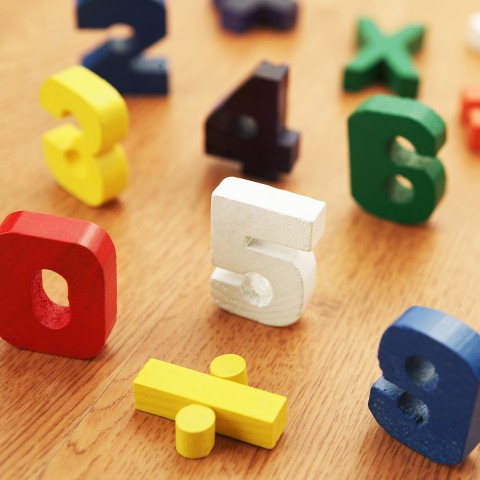
If you’ve just started learning Chinese from scratch, you’re probably still adjusting to the learning curve. At this point in your studies, memorizing basic vocabulary should be one of your top priorities.
You may have already sniffed out some basic Chinese words for beginners from other sources, but some of the words you’ve come across may not be that helpful in real life.
In this guide, we’ve collected over 200 important Chinese words for beginners tailored for your needs. Look no further, and start mastering these basic Chinese words right away!
 Table of Contents
Table of Contents
1. Pronouns
Pronouns are an essential component of Chinese vocabulary, so learning them early on is a great idea. Here are the personal, interrogative, and demonstrative Chinese pronouns you should know:
1 – Personal Subject Pronouns
| In Chinese | Romanization | In English | |
| 1st person singular | 我 | wǒ | “I” |
| 2nd person singular | 你 / 您 (casual / formal) | nǐ / nín | “You” |
| 3rd person singular¹ | 他 / 她 / 它 | tā | “He” / “She” / “It” |
| 1st person plural² | 我们 / 咱们 | wǒ men / zán men | “We” |
| 2nd person plural | 你们 | nǐ men | “You” |
| 3rd person plural | 他们 / 她们 / 它们 | tā men | “They” (He / She / It) |
¹ Note that the third person singular pronouns all have the same pronunciation.
² 咱们 is a little different from 我们 as it specifies that the listener is a part of “we” as well.
2 – Interrogative Pronouns

If you have a question, you gotta ask!
In Chinese: 哪个
Pinyin: nǎ gè
In English: “Which”
In Chinese: 谁的
Pinyin: shuí de
In English: “Whose”
In Chinese: 什么时候 / 何时 (casual / formal)
Pinyin: shén me shí hòu / hé shí
In English: “When”
In Chinese: 怎样 / 如何 (casual / formal)
Pinyin: zěn yàng / rú hé
In English: “How”
In Chinese: 哪里
Pinyin: nǎ lǐ
In English: “Where”
In Chinese: 谁
Pinyin: shuí
In English: “Who”
In Chinese: 什么
Pinyin: shén me
In English: “What”
3 – Demonstrative Pronouns
In Chinese: 这个
Pinyin: zhè gè
In English: “This”
In Chinese: 那个
Pinyin: nèi gè / nà gè (casual / formal)
In English: “That”
Additional notes: The official pronunciation in dictionaries is nà gè, but for easier pronunciation in daily life, native Chinese speakers tend to pronounce it as nèi gè.
In Chinese: 这些
Pinyin: zhè xiē
In English: “These”
In Chinese: 那些
Pinyin: nèi xiē / nà xiē (casual / formal)
In English: “Those”
2. Numbers 1-10

Numbers are essential in many daily-life conversations.
In Chinese: 一
Pinyin: yī
In English: “One”
In Chinese: 二 / 两
Pinyin: èr / liǎng
In English: “Two”
Additional notes: 二 is used more for numbers, while 两 is generally used for specifying quantities (such as “two of something”).
In Chinese: 三
Pinyin: sān
In English: “Three”
In Chinese: 四
Pinyin: sì
In English: “Four”
In Chinese: 五
Pinyin: wǔ
In English: “Five”
In Chinese: 六
Pinyin: liù
In English: “Six”
In Chinese: 七
Pinyin: qī
In English: “Seven”
In Chinese: 八
Pinyin: bā
In English: “Eight”
In Chinese: 九
Pinyin: jiǔ
In English: “Nine”
In Chinese: 十
Pinyin: shí
In English: “Ten”
3. Nouns
Nouns are perhaps the most important part of speech to learn as a beginner. A noun can represent a person, a place, a thing, or even an idea. You need nouns in order to make a complete sentence, and in a pinch, you can communicate an immediate need using nouns alone! Following are several simple Chinese nouns in different categories.

Time is precious.
1 – Time
In Chinese: 时间
Pinyin: shí jiān
In English: “Time”
In Chinese: 小时
Pinyin: xiǎo shí
In English: “Hour”
In Chinese: 分钟
Pinyin: fēn zhōng
In English: “Minute”
In Chinese: 早晨 / 上午
Pinyin: zǎo chén / shàng wǔ
In English: “Morning”
In Chinese: 中午
Pinyin: zhōng wǔ
In English: “Noon”
In Chinese: 下午
Pinyin: xià wǔ
In English: “Afternoon”
In Chinese: 天
Pinyin: tiān
In English: “Day”
In Chinese: 月
Pinyin: yuè
In English: “Month”
In Chinese: 年
Pinyin: nián
In English: “Year”
In Chinese: 周一 / 星期一 (formal / casual)
Pinyin: zhōu yī / xīng qī yī
In English: “Monday”
In Chinese: 周二 / 星期二
Pinyin: zhōu èr / xīng qī èr
In English: “Tuesday”
In Chinese: 周三 / 星期三
Pinyin: zhōu sān / xīng qī sān
In English: “Wednesday”
In Chinese: 周四 / 星期四
Pinyin: zhōu sì / xīng qī sì
In English: “Thursday”
In Chinese: 周五 / 星期五
Pinyin: zhōu wǔ / xīng qī wǔ
In English: “Friday”
In Chinese: 周六 / 星期六
Pinyin: zhōu liù / xīng qī liù
In English: “Saturday”
In Chinese: 周日 / 星期日
Pinyin: zhōu rì / xīng qī rì
In English: “Sunday”
In Chinese: 周末
Pinyin: zhōu mò
In English: “Weekend”
In Chinese: 工作日
Pinyin: gōng zuò rì
In English: “Workday”
2 – People
In Chinese: 先生
Pinyin: xiān sheng
In English: “Mr.”
In Chinese: 女士
Pinyin: nǚ shì
In English: “Ms.”
In Chinese: 爸爸 / 父亲
Pinyin: bà ba / fù qin
In English: “Dad” / “Father”
In Chinese: 妈妈 / 母亲
Pinyin: mā ma / mǔ qin
In English: “Mom” / “Mother”
In Chinese: 阿姨
Pinyin: ā yí
In English: “Aunt”
Additional notes: In China, young people often have to call their elders “Aunt” / “Uncle” even if they’re not related. Thus, these are important people-related words to learn.
In Chinese: 叔叔
Pinyin: shū shu
In English: “Uncle”
In Chinese: 家人
Pinyin: jiā rén
In English: “Family”
3 – Places

What is your destination in life?
In Chinese: 地点
Pinyin: dì diǎn
In English: “Place”
In Chinese: 医院
Pinyin: yī yuàn
In English: “Hospital”
In Chinese: 学校
Pinyin: xué xiào
In English: “School”
In Chinese: 市中心
Pinyin: shì zhōng xīn
In English: “Downtown”
In Chinese: 厕所
Pinyin: cè suǒ
In English: “Bathroom”
In Chinese: 餐厅
Pinyin: cān tīng
In English: “Restaurant”
In Chinese: 宾馆
Pinyin: bīn guǎn
In English: “Hotel”
4 – School/Office Essentials
In Chinese: 办公室
Pinyin: bàn gōng shì
In English: “Office”
In Chinese: 钢笔
Pinyin: gāng bǐ
In English: “Pen”
In Chinese: 笔记本
Pinyin: bǐ jì běn
In English: “Notebook”
In Chinese: 电脑
Pinyin: diàn nǎo
In English: “Computer”
In Chinese: 书桌
Pinyin: shū zhuō
In English: “Desk”
5 – Body Parts
In Chinese: 身体
Pinyin: shēn tǐ
In English: “Body”
In Chinese: 眼睛
Pinyin: yǎn jīng
In English: “Eyes”
In Chinese: 鼻子
Pinyin: bí zi
In English: “Nose”
In Chinese: 脸
Pinyin: liǎn
In English: “Face”
In Chinese: 手臂
Pinyin: shǒu bì
In English: “Arm”
In Chinese: 耳朵
Pinyin: ěr duo
In English: “Ear”
In Chinese: 手
Pinyin: shǒu
In English: “Hand”
In Chinese: 腿
Pinyin: tuǐ
In English: “Leg”
In Chinese: 脚
Pinyin: jiǎo
In English: “Foot”
In Chinese: 手指
Pinyin: shǒu zhǐ
In English: “Finger”
6 – Food
In Chinese: 食物
Pinyin: shí wù
In English: “Food”
In Chinese: 果汁
Pinyin: guǒ zhī
In English: “Juice”
In Chinese: 鸡蛋
Pinyin: jī dàn
In English: “Egg”
In Chinese: 牛奶
Pinyin: niú nǎi
In English: “Milk”
In Chinese: 肉
Pinyin: ròu
In English: “Meat”
In Chinese: 水果
Pinyin: shuǐ guǒ
In English: “Fruit”
In Chinese: 蔬菜
Pinyin: shū cài
In English: “Vegetable”
In Chinese: 米饭
Pinyin: mǐ fàn
In English: “Rice”
In Chinese: 面条
Pinyin: miàn tiáo
In English: “Noodles”
In Chinese: 蛋糕
Pinyin: dàn gāo
In English: “Cake”
In Chinese: 超市
Pinyin: chāo shì
In English: “Supermarket”
In Chinese: 快餐
Pinyin: kuài cān
In English: “Fast food”
In Chinese: 汉堡
Pinyin: hàn bǎo
In English: “Hamburger”
In Chinese: 薯条
Pinyin: shǔ tiáo
In English: “French fries”
In Chinese: 勺子
Pinyin: sháo zi
In English: “Spoon”
In Chinese: 筷子
Pinyin: kuài zi
In English: “Chopstick”
In Chinese: 碗
Pinyin: wǎn
In English: “Bowl”
In Chinese: 盘子
Pinyin: pán zi
In English: “Plate”
In Chinese: 零食
Pinyin: líng shí
In English: “Snack”
In Chinese: 海鮮
Pinyin: hǎi xiān
In English: “Seafood”
In Chinese: 面包
Pinyin: miàn bāo
In English: “Bread”
4. Verbs
Another set of essential beginner words in Chinese are verbs. Used together with nouns, they allow you to form complete sentences and better express yourself. To give you a headstart, here are the most commonly used verbs in Chinese!
1 – Daily Routine Verbs:
In Chinese: 起床
Pinyin: qǐ chuáng
In English: “Get up”
In Chinese: 吃
Pinyin: chī
In English: “Eat”
In Chinese: 喝
Pinyin: hē
In English: “Drink”
In Chinese: 去
Pinyin: qù
In English: “Go”
In Chinese: 工作
Pinyin: gōng zuò
In English: “Work”
In Chinese: 学习
Pinyin: xué xí
In English: “Study”
In Chinese: 驾驶
Pinyin: jià shǐ
In English: “Drive”
In Chinese: 骑
Pinyin: qí
In English: “Ride”
In Chinese: 睡觉
Pinyin: shuì jiào
In English: “Sleep”
In Chinese: 休息
Pinyin: xiū xī
In English: “Rest”
In Chinese: 做饭
Pinyin: zuò fàn
In English: “Cook”
2 – Other Commonly Used Verbs
In Chinese: 给
Pinyin: gěi
In English: “Give”
In Chinese: 获得
Pinyin: huò dé
In English: “Get”
In Chinese: 制作
Pinyin: zhì zuò
In English: “Make”
In Chinese: 做
Pinyin: zuò
In English: “Do”
In Chinese: 让
Pinyin: ràng
In English: “Let”
In Chinese: 问
Pinyin: wèn
In English: “Ask”
In Chinese: 笑
Pinyin: xiào
In English: “Smile”
In Chinese: 找
Pinyin: zhǎo
In English: “Find”
In Chinese: 哭
Pinyin: kū
In English: “Cry”
In Chinese: 坐
Pinyin: zuò
In English: “Sit”
In Chinese: 站
Pinyin: zhàn
In English: “Stand”
In Chinese: 喜欢
Pinyin: xǐ huān
In English: “Like”
In Chinese: 爱
Pinyin: ài
In English: “Love”
In Chinese: 告诉
Pinyin: gào sù
In English: “Tell”
In Chinese: 希望
Pinyin: xī wàng
In English: “Hope”
In Chinese: 看
Pinyin: kàn
In English: “Look”
In Chinese: 忘记
Pinyin: wàng jì
In English: “Forget”
In Chinese: 失去 / 丢失 (something / someone)
Pinyin: shī qù / diū shī
In English: “Lose” / “Lost”
In Chinese: 记住
Pinyin: jì zhù
In English: “Remember”
In Chinese: 离开
Pinyin: lí kāi
In English: “Leave”
In Chinese: 发生
Pinyin: fā shēng
In English: “Happen”
In Chinese: 认为 / 思考
Pinyin: fā shēng
In English: “Think”
In Chinese: 完成
Pinyin: wán chéng
In English: “Finish”
In Chinese: 变化
Pinyin: biàn huà
In English: “Change”
In Chinese: 感激
Pinyin: gǎn jī
In English: “Thank”
In Chinese: 走
Pinyin: zǒu
In English: “Walk”
In Chinese: 跳舞
Pinyin: tiào wǔ
In English: “Dance”
In Chinese: 唱歌
Pinyin: chàng gē
In English: “Sing”
In Chinese: 走
Pinyin: zǒu
In English: “Walk”
In Chinese: 跑
Pinyin: pǎo
In English: “Run”
In Chinese: 读
Pinyin: dú
In English: “Read”
In Chinese: 听
Pinyin: tīng
In English: “Listen”
In Chinese: 写
Pinyin: xiě
In English: “Write”
In Chinese: 回答
Pinyin: huí dá
In English: “Answer”
In Chinese: 问
Pinyin: wèn
In English: “Ask”
In Chinese: 说
Pinyin: shuō
In English: “Speak”
In Chinese: 买
Pinyin: mǎi
In English: “Buy”
In Chinese: 卖
Pinyin: mài
In English: “Sell”
In Chinese: 观察
Pinyin: guān chá
In English: “Observe”
5. Adjectives
Our list below is a great place to start, but make sure to visit our list of 100 Chinese adjectives for even more vocabulary!
1 – Describing Objects
In Chinese: 大的
Pinyin: dà de
In English: “Big”
In Chinese: 小的
Pinyin: xiǎo de
In English: “Small”
In Chinese: 长的
Pinyin: cháng de
In English: “Long”
In Chinese: 短的
Pinyin: duǎn de
In English: “Short”
In Chinese: 苗条的
Pinyin: miáo tiáo de
In English: “Skinny”
In Chinese: 强壮的
Pinyin: qiáng zhuàng de
In English: “Strong”
2 – Describing People
In Chinese: 好看的
Pinyin: hǎo kàn de
In English: “Pretty”
In Chinese: 英俊的
Pinyin: yīng jùn de
In English: “Handsome”
In Chinese: 高的
Pinyin: gāo de
In English: “Tall”
In Chinese: 矮的
Pinyin: ǎi de
In English: “Short”
In Chinese: 疑惑的
Pinyin: yí huò de
In English: “Confused”
3 – Describing Emotions
In Chinese: 开心的
Pinyin: kāi xīn de
In English: “Happy”
In Chinese: 难过的
Pinyin: nán guò de
In English: “Sad”
In Chinese: 害怕的
Pinyin: hài pà de
In English: “Scared”
In Chinese: 感动的
Pinyin: gǎn dòng de
In English: “Touched”
In Chinese: 惊喜的
Pinyin: jīng xǐ de
In English: “Surprised”
In Chinese: 激动的
Pinyin: jī dòng de
In English: “Excited”
In Chinese: 失望的
Pinyin: shī wàng de
In English: “Disappointed”
In Chinese: 骄傲的
Pinyin: jiāo ào de
In English: “Proud”
In Chinese: 轻松的
Pinyin: qīng sōng de
In English: “Relaxed”
In Chinese: 生气的
Pinyin: shēng qì de
In English: “Angry”
In Chinese: 沮丧的
Pinyin: jǔ sàng de
In English: “Upset”
In Chinese: 忧伤的
Pinyin: yōu shāng de
In English: “Depressed”
In Chinese: 冷静的
Pinyin: lěng jìng de
In English: “Calm”
In Chinese: 释然的
Pinyin: shì rán de
In English: “Relieved”
In Chinese: 乐观的
Pinyin: lè guān de
In English: “Optimistic”
In Chinese: 悲观的
Pinyin: bēi guān de
In English: “Pessimistic”
4 – Describing the Weather
1.
In Chinese: 下雨的
Pinyin: xià yǔ de
In English: “Rainy”
2.
In Chinese: 多云的
Pinyin: duō yún de
In English: “Cloudy”
3.
In Chinese: 多风的
Pinyin: duō fēng de
In English: “Windy”
4.
In Chinese: 晴朗的
Pinyin: qíng lǎng de
In English: “Sunny”
5.
In Chinese: 下雪的
Pinyin: xià xuě de
In English: “Snowy”
6. Conjunctions
In Chinese: 并且
Pinyin: bìng qiě
In English: “And”
In Chinese: 但是
Pinyin: dàn shì
In English: “But”
In Chinese: 然后
Pinyin: rán hòu
In English: “Then”
In Chinese: 因为
Pinyin: yīn wèi
In English: “Because”
In Chinese: 所以
Pinyin: suǒ yǐ
In English: “So”
In Chinese: 因此
Pinyin: yīn cǐ
In English: “Thus”
In Chinese: 还有
Pinyin: hái yǒu
In English: “Also”
In Chinese: 之前
Pinyin: zhī qián
In English: “Before”
In Chinese: 之后
Pinyin: zhī hòu
In English: “After”
In Chinese: 从此
Pinyin: cóng cǐ
In English: “Since”
7. Classifier
In Chinese: 只
Pinyin: zhī
Example objects to use for: Cats
In Chinese: 头
Pinyin: tóu
Example objects to use for: Cows
In Chinese: 个
Pinyin: gè
Example objects to use for: People
In Chinese: 条
Pinyin: tiáo
Example objects to use for: Fish
In Chinese: 支
Pinyin: zhī
Example objects to use for: Pens
8. Conclusion
Now that you’ve learned over 200 Chinese words for beginners, the vocabulary may seem overwhelming at first. However, as long as you keep practicing them every day, everything will fall into place. Using these basic Chinese words will eventually become second nature.
You’ll soon find yourself passing the beginner stage and moving forward to the intermediate and advanced stages. If you feel like there aren’t enough learning resources available to you, ChineseClass101 is always here to be your greatest helper.
ChineseClass101 has professional, entertaining materials for Chinese learners at every stage of their language learning journey, and you’ll definitely find what you’re looking for here. Become a member today and experience all that our website has to offer!
What other basic Chinese words do you want to know? Are there any you’re confused about? Comment below to let us know!










